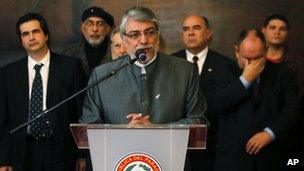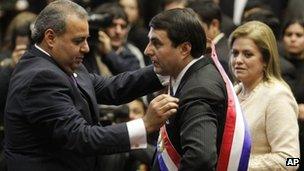Paraguay President Fernando Lugo impeached by congress
- Published

Mr Lugo addressed the nation after the vote
Paraguay's Senate has voted to impeach left-wing President Fernando Lugo, forcing him to step down.
Both houses of Congress had voted on Thursday to begin impeachment proceedings over his handling of clashes between farmers and police last week in which at least 17 people died.
Mr Lugo likened the move to a coup by the right wing-controlled parliament, but said he would accept the decision.
Vice-President Federico Franco has already been sworn in as president.
He will serve the remainder of Mr Lugo's five-year term, which ends in August 2013.
After previously trying to get the Supreme Court to stop the impeachment vote, the fallen president said he accepted "what the law has stated, even though the law was twisted".
'No coup'
Calling on his supporters to remain calm, he added that "the history of Paraguay and its democracy have been deeply wounded".
Mr Lugo's 2008 election ended 61 years of rule by the right-wing Colorado party.
The two main political parties, Colorado and Liberal, had put aside their differences and voted in favour of the motion to begin the impeachment trial.
The Liberals are part of Mr Lugo's ruling coalition.
In an appeal filed with Paraguay's Supreme Court on Friday, Mr Lugo's lawyers had said the proceedings do not ensure due process and that the president should have been granted more time to prepare.
A centre-right legislator, Carlos Maria, denied allegations of unconstitutionality. "There's nothing illegal here, there's no constitutional rupture, no coup," he told AP.
The impeachment sparked clashes between police on horseback and supporters of Mr Lugo massed outside the National Congress building in the capital Asuncion.
"We do not want the return of dictatorship," one protester who had travelled to the capital from the Brazilian border told the AFP news agency.
Water cannon was used by police to drive the protesters back.
'Poor performance'
The impeachment sparked clashes between police on horeseback and supporters of Mr Lugo
The impeachment motion accused Mr Lugo of a "poor performance" during the forced land eviction last Friday, in which seven police officers and at least nine farmers were killed.
Speaking on national television on Thursday, Mr Lugo said he would not resign, but "face the consequences" of the trial. He accused his opponents of carrying out an "express coup d'etat".
The Union of South American Nations has send an urgent mission of foreign ministers to Paraguay to "ensure the right to defend democracy".
Ecuador's President Rafael Correa warned that the regional bloc could invoke its "democracy clause" to sever ties with Paraguay and even close its borders if Mr Lugo is not tried according to "due process".
BBC regional analyst Leonardo Rocha says South American countries are worried that Mr Lugo, Paraguay's first left-wing president, is the victim of a political trial by the Colorado party and other right-wing groups.
Several South American countries, including neighbouring Argentina and Bolivia, have already said they do not recognise the new government, reports say.

Vice-President Federico Franco was sworn in as president shortly after Mr Lugo's impeachment
Land clashes
During the clashes in eastern Canindeyu province that prompted the impeachment move, more than 300 police officers tried to evict 150 landless farmers from an estate owned by a wealthy businessman who is also a political opponent of Mr Lugo.
The eviction escalated into violence and the farmers opened fire on the police.
The farmers have argued the land was illegally taken during the 1954-1989 military rule of Gen Alfredo Stroessner and distributed among his allies.
Land disputes are not unusual in Paraguay, where a small fraction of the population owns about 80% of the land.
Mr Lugo - a former Catholic bishop who abandoned priesthood to enter politics - campaigned for the needs of the poor.
Before being elected in 2008, he promised land for some 87,000 landless families.
On Wednesday, in an attempt to calm tensions over the incident, Mr Lugo said he would open an investigation into what happened.
- Published16 June 2012
- Published16 August 2011